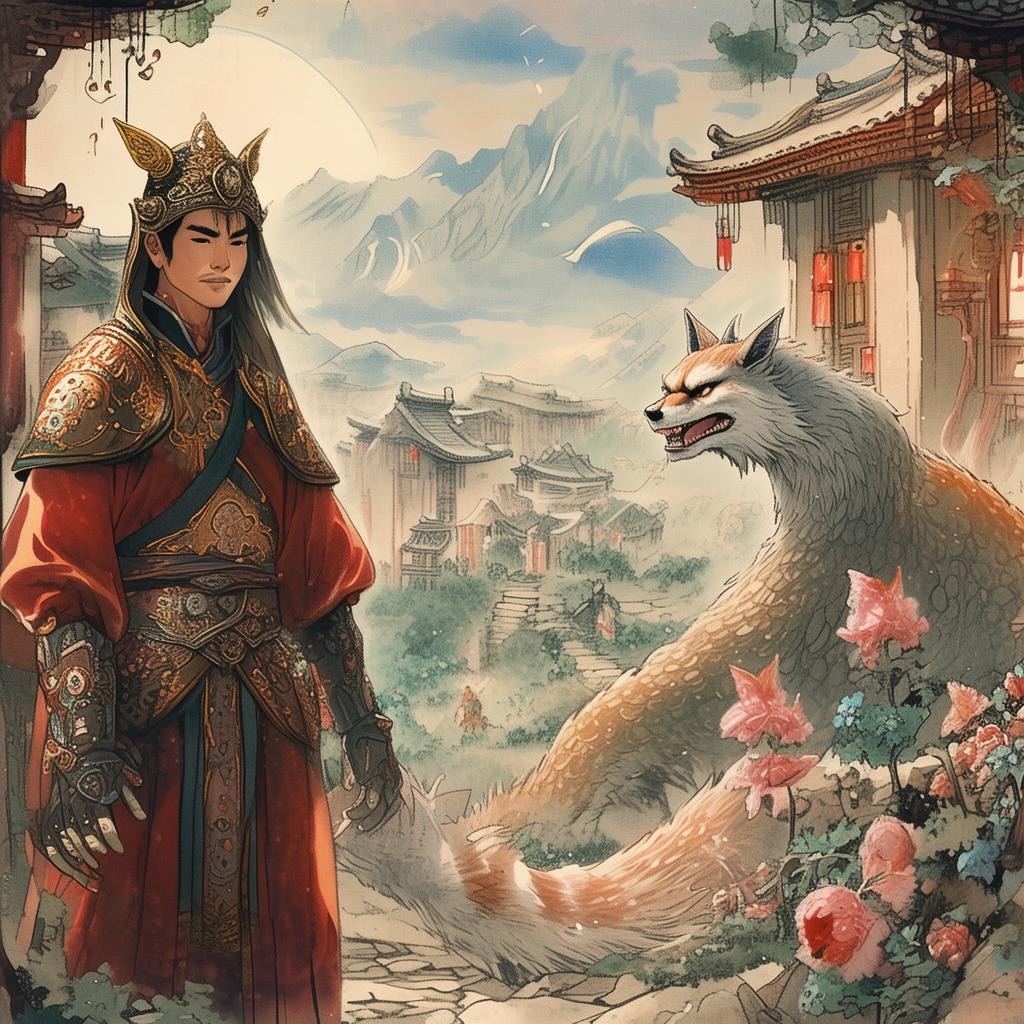The Labyrinth of Echoing Echoes: A Scholar's Riddle
In the heart of the ancient kingdom of Ling, where the mountains kissed the clouds and the rivers whispered secrets, there stood a labyrinth that had been forgotten by time. The walls of the labyrinth were woven from the bones of ancient serpents, and its entrance was hidden behind a veil of thorny vines, guarded by statues of mythical creatures that seemed to move with the wind. It was said that the labyrinth was the birthplace of the kingdom, a place where the first king had found wisdom and the people had found their destiny.
The kingdom was now ruled by a young and ambitious prince, who had heard tales of the labyrinth's mysteries and its power to grant immense knowledge to those who dared to enter. Among the scholars of the court, there was one who stood out, a foreigner named Liang, whose mind was as sharp as the blade of a samurai and whose heart was as pure as the crystal-clear waters of the kingdom's greatest river.

Liang had spent years studying the ancient texts, seeking the wisdom that would elevate his kingdom to new heights. He had read of the labyrinth, of the riddle that was whispered by the echoes within its walls, and of the truth that would be revealed to the one who could solve it. Determined to uncover the labyrinth's secrets, Liang approached the prince, seeking permission to enter the forbidden place.
The prince, intrigued by Liang's determination and the promise of newfound knowledge, granted him leave. With a heart full of hope and a mind full of questions, Liang stepped through the veil of thorny vines and into the labyrinth.
The labyrinth was a maze of interconnected paths, each more treacherous than the last. Liang moved cautiously, his eyes scanning the walls for clues. The air was thick with the scent of ancient wood and the distant echo of whispers that seemed to come from everywhere and nowhere. He followed a path that led him to a chamber where a single, ancient book lay open on a pedestal. The book was written in a language he did not recognize, but the images were clear, depicting the labyrinth itself and the journey he was on.
As he read, Liang realized that the book was a guide, a map to the riddle. He learned that the labyrinth was not just a physical structure, but a metaphor for the mind itself, and that the riddle was a reflection of the prince's own soul.
The path led him to a chamber where a statue of the first king stood, its eyes watching him with an ancient wisdom. Liang approached the statue and found a riddle etched into its base:
What is the path that leads to the end of all things?
What is the answer that cannot be given?
What is the truth that is hidden in plain sight?
Liang pondered the riddle, his mind racing with possible answers. He thought of the labyrinth, of the paths that led to the center, and of the truth that was hidden within the walls of the kingdom. He thought of the prince, of his ambition and his desire for knowledge, and of the price he might pay for it.
Just as he was about to give up, the echoes of the labyrinth seemed to speak to him, a voice that was both familiar and alien. "The path that leads to the end of all things is the path of self-discovery," the voice said. "The answer that cannot be given is the answer that you seek within yourself. The truth that is hidden in plain sight is the truth that you have already seen."
Liang's heart raced as he realized the truth of the voice. He had been seeking knowledge outside of himself, when the answer had been within him all along. He turned to the prince, who stood at the entrance of the labyrinth, his face a mask of determination.
"Liang," the prince said, "the truth of the kingdom lies within you. The wisdom of the labyrinth is not in the paths that lead to its center, but in the journey itself. You have found the answer."
Liang nodded, understanding the prince's words. He had discovered that the labyrinth was a reflection of the mind, and that the riddle was a test of character. The truth he sought was not in the labyrinth, but in himself.
With newfound wisdom, Liang returned to the court, where he shared his discovery with the prince and the people. The kingdom flourished under his guidance, and Liang's name was forever etched in the annals of history as the one who had solved the riddle of the labyrinth.
The labyrinth of echoing echoes remained a place of mystery and wonder, a testament to the power of self-discovery and the enduring truth that the greatest knowledge lies within.
✨ Original Statement ✨
All articles published on this website (including but not limited to text, images, videos, and other content) are original or authorized for reposting and are protected by relevant laws. Without the explicit written permission of this website, no individual or organization may copy, modify, repost, or use the content for commercial purposes.
If you need to quote or cooperate, please contact this site for authorization. We reserve the right to pursue legal responsibility for any unauthorized use.
Hereby declared.









